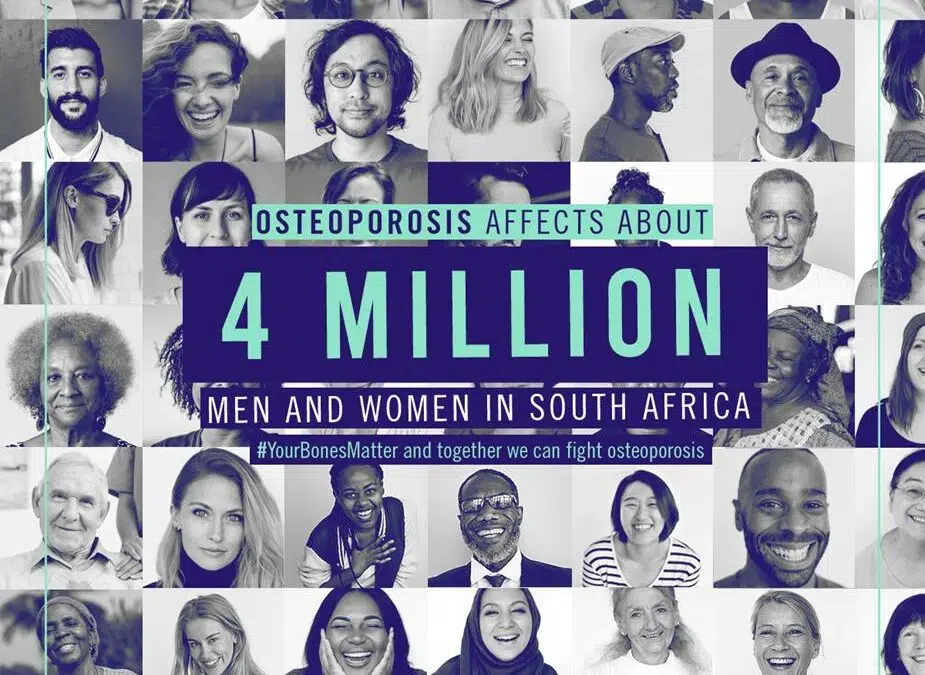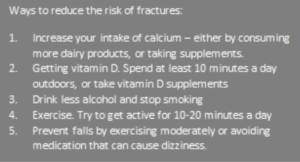
This release also appears on the National Osteoporosis Foundation of South Africa website.
As South Africa marks World Osteoporosis Day on October 20, the National Osteoporosis Foundation of South Africa has launched Your Bones Matter – a national campaign to advocate for better approaches to diagnosing and treating osteoporosis patients.
Osteoporosis is a disease that deteriorates bone tissue and weakens bones. Its risk factors include medical and chronic conditions like HIV, cancer, rheumatoid arthritis and early menopause. It can lead to fragility fractures, which not only severely affect quality of life but can also increase the likelihood of premature death. The two most common osteoporotic fractures are of the vertebra, and of the hip. Patients with hip fractures have a 20-30% increased risk of death within a year of their first fracture.
While it is not always easy to avoid bone density loss, the good news is that early diagnosis and a good treatment plan can prevent about 70% of osteoporotic fractures, helping patients to live longer, better, more fulfilling lives.
 According Tereza Hough, CEO of the NOFSA, there are several ways to prevent the life-altering impact of osteoporosis. “The best thing you can do to improve your bone health is to take action quickly,” says Hough. “Speak to your doctor about your risk factors, ask for a bone density scan, stick to your prescribed treatment plan and follow a bone-healthy lifestyle to reduce your risk of fractures.”
According Tereza Hough, CEO of the NOFSA, there are several ways to prevent the life-altering impact of osteoporosis. “The best thing you can do to improve your bone health is to take action quickly,” says Hough. “Speak to your doctor about your risk factors, ask for a bone density scan, stick to your prescribed treatment plan and follow a bone-healthy lifestyle to reduce your risk of fractures.”
However, despite patients’ best efforts to manage their bone health, they often need intensive treatment which involves hospitalisation and surgery. For patients over 45, osteoporosis accounts for more days in hospital than diseases like breast cancer or diabetes, or treatment for heart attacks.
Hough says treatment is expensive and medical aid schemes often fall short in providing for osteoporosis patients. “While medical aids will pay for procedures, like surgeries to treat fractures, , they don’t pay for the medication patients need to prevent future fractures. We need urgent action to change this because our patients deserve better.”
Thecla Macdonald, a pensioner from a small town in the Western Cape, is one such patient. Diagnosed with osteoporosis nearly 20 years ago and oesophageal cancer a decade later, she experienced her first fracture. “As a consequence of radiation I broke my spine which was extremely painful. Now, I am scared to fall because if I break a hip there’s a big chance I won’t survive,” says Macdonald.
She is trying her best to prevent more fractures but hopes that medical aids would provide better care for patients like her: “I take my medication regularly but it is expensive and medical aid doesn’t pay for it. It must cost them a fortune to keep us in hospital when we have fractures so it would make more sense for them to pay for the medication we need.”
Stories like Macdonald’s motivate NOFSA to continue using campaigns like Your Bones Matter to raise awareness of osteoporosis and advocate for patients’ access to medication.
“Osteoporosis is a neglected disease area and unless our government and medical aids commit to improving the way we care for patients, many more lives will be affected by this debilitating disease,” says Hough.
For more information, contact the National Osteoporosis Foundation of South Africa (NOFSA) help line at 0861102265,WhatsApp 068 491 3543 e-mail [email protected], visit www.osteoporosis.org.za
Media queries
Recent Posts

Global Alliance for Patient Access
© 2026 GAfPA. All Rights Reserved
| Cookie | Duration | Description |
|---|---|---|
| cookielawinfo-checkbox-analytics | 11 months | This cookie is set by GDPR Cookie Consent plugin. The cookie is used to store the user consent for the cookies in the category "Analytics". |
| cookielawinfo-checkbox-functional | 11 months | The cookie is set by GDPR cookie consent to record the user consent for the cookies in the category "Functional". |
| cookielawinfo-checkbox-necessary | 11 months | This cookie is set by GDPR Cookie Consent plugin. The cookies is used to store the user consent for the cookies in the category "Necessary". |
| cookielawinfo-checkbox-others | 11 months | This cookie is set by GDPR Cookie Consent plugin. The cookie is used to store the user consent for the cookies in the category "Other. |
| cookielawinfo-checkbox-performance | 11 months | This cookie is set by GDPR Cookie Consent plugin. The cookie is used to store the user consent for the cookies in the category "Performance". |
| viewed_cookie_policy | 11 months | The cookie is set by the GDPR Cookie Consent plugin and is used to store whether or not user has consented to the use of cookies. It does not store any personal data. |